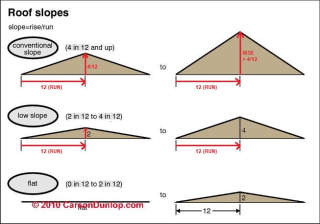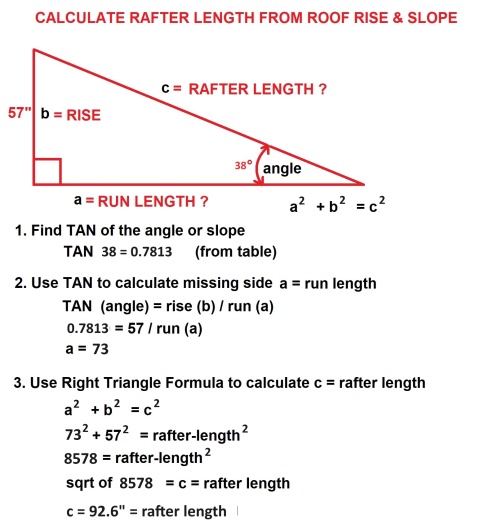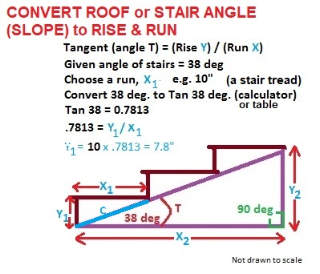 Roof Rafter Length Calculation
Roof Rafter Length Calculation
How to calculate rafter length from roof rise or run & slope
- POST a QUESTION or COMMENT about types of roof framing calculations: rafter lengths
Roof rafter length or calculation is easy if we know any two roof measurement numbers chosen from:
Roof total rise (at the ridge), roof horizontal run distance, rafter length, or roof slope in rise/run or slope or percent slope or even a tangent value.
These same calculations used for roof rafter length will let you compute the length of roof trusses or the length of ramp or stair support stringers.
This article series gives every possible way to figure out any or all roof dimensions and measurements expressing the roof area, width, length, slope, rise, run, and unit rise in inches per foot.
Page top sketch of various roof slopes is provided courtesy of Carson Dunlop Associates, Toronto.
InspectAPedia tolerates no conflicts of interest. We have no relationship with advertisers, products, or services discussed at this website.
- Daniel Friedman, Publisher/Editor/Author - See WHO ARE WE?
How to Calculate Roof Rafter Length from Slope & Rise
 Question: if my roof slope is 32° and the rise is 4' 9", how long will the rafter be
Question: if my roof slope is 32° and the rise is 4' 9", how long will the rafter be
Anonymous asked:
The angle of elevation of a roof top is 32°. If the vertical change in height is 4 feet 9 inches as indicated, how long must the rafter be? - 2021/11/12
Moderator reply:
Here is a summary of how we use the TAN or tangent function to calculate the length of a rafter when all we know is the roof slope and the roof total rise.
Tangent of an angle is defined as the ratio of the length of the right triangle's side adjacent to the angle (a) to the length of the side opposite the angle (b).
Knowing the tangent of the roof angle or slope + the length of either of the two sides (roof rise or roof run) lets us calculate the length of the missing side.
Knowing the length of any two sides of a right triangle lets us calculate the length of the missing side, because the relationship of the three sides of a right triangle can be written as the square of their lengths/
[Click to enlarge any image]
Note: if your roof slope is expressed in the more widely used "rise" such as a rise of 7.5" meaning the roof slope rises 7.5" for every 12" (or foot) of horizontal run, and if you want to convert that to a roof angle in degrees (as we use roof angle on this page) then
see CONVERT ROOF SLOPE or ANGLE in DEGREES to RISE or RUN
Details of Rafter Calculations from Roof Slope
Here are the details of the rafter length calculation given above
THANK YOU for asking a helpful question: how to calculate rafter length if all we know is the roof rise and roof angle or slope.
In our sketch (above) and below in more detail we show you how to calculate the rafter length you want.
At and also at ROOF SLOPE CALCULATIONS in a section titled "How to Convert Slope or Angle in Degrees into Distance Rise or Run" we go through the basic calculations using a 38° roof.
You'd use 32° instead of our example of 38° roof slope and use the TAN function (or a TANGENTS TABLE like the one we provide in that article) to calculate the sloped side or upper side of your triangle - the rafter.
When we know the length of just one side (rise or b in your problem an din our sketch above)
and where we know the roof slope in degrees (32° )
we can use the Tangent function to give us the ratio of two sides of our roof triangle (one of which, the rafter length) is unknown.
Then we can use simple algebra and arithemetic to calculate the rafter length.
Here's how we do it.
In ROOF SLOPE CALCULATIONS we state
A tangent is also defined as a ratio of two lengths: the length of the side of the triangle opposite the angle divided by the length of the adjacent side of the angle.
For a right triangle (such as a roofing triangle) in which the roof rise is the vertical line opposite the roof angle or slope, the tangent of the roof angle is the ratio of roof rise over the length of the sloped roof surface.
In your problem statement the tangent T of the 32 degree angle (the roof slope) is the ratio:
TAN (Roof Angle or Slope) = Roof Rise / Roof Horizontal Run
So we write the tangent of angle A as:
Tan <a = rise (b) / run (a)
or
tan 32° = rise (4 ft 9 in or all in inches: 48+9 = 57 inches) / run (unknown)
or, looking up 32 in the TAN table found at ROOF SLOPE CALCULATIONS (or on your calculator)
Tan 32° = 0.6249 = 57 / run (b)
using basic rules of algebra we can rewrite the equation: multiply both sides by run (b)
0.6249 x (b) = 57
b = 57 / 0.6249
b = 91.2 inches - this is the run length
Now that we used tan to find the run length, we’ll go back to our formula for the lengths of sides of a right triangle -your roof.
Key concept: If we know the length of any two sides of a right triangle we can calcluate the length of the missing side.
Remember the basic formula for the lengths of sides of a right triangle (half of a roof)
For any right triangle: a2 + b2 = c2
where for a roof we can set
- a = horizontal run - in our example above this is also give as X
- b = vertical rise or change in height - in our example above this is also given as Y
- c = the diagonal slope length or rafter length or the hypotenuse of a right triangle
Run2 + Rise2 = Rafter-length2
91.22 + 572 = rafter length2
whip out my handy smartphone calculator and punch the numbers
8317.44 + 3249 = rafter-length2
11,566 = rafter-length2 or the rafter length squared
whip that calculator again to give us the square root:
sqrt of 11,566 = 107.5 inches ! that’s your rafter length
In feet that's a run of 8.96 ft or nominally 9 ft.
Watch out: you will need to increase the rafter length (increase the "run" of the roof) by the amount of overhang that you want - how far the rooftop should extend out over or past the building exterior wall.
For help using measurements of slope, angle, or degrees to calculate roof rise or run lengths
see CONVERT ROOF SLOPE or ANGLE in DEGREES to RISE or RUN
Below: another useful illustration showing the relationship between roof rise & run & slope.
Watch out: the first Y1 value in the sketch is 10" not 12" but in normal roof framing and stair framing talk, the "unit rise" means the amount of gain in height over 12-inches or one foot of horizontal distance traveled.
We used 10" here to show that we al do these slope and rise or run conversions for any number, and that this procedure works for stairs as well as roofs.
Good luck on your test, and thank you once again to my high-school algebra teacher.
...
Continue reading at ROOF SLOPE DEFINITIONS or select a topic from the closely-related articles below, or see the complete ARTICLE INDEX.
Or see these
Recommended Articles
- CALCULATE RISE & RUN from SLOPE
- LOW SLOPE ROOFING
- ROOF AREA CALCULATIONS
- ROOF MEASUREMENTS
- ROOF SLOPE CALCULATIONS
- ARCTANGENT CALCULATES ROOF / STAIR ANGLE
- CONVERT PERCENT GRADE to ANGLE or SLOPE
- CONVERT ROOF SLOPE or ANGLE in DEGREES to RISE or RUN
- CALCULATE ROOF HEIGHT from SLOPE & RUN or BUILDING WIDTH
- CALCULATE RAFTER LENGTH from SLOPE & RISE
- CALCULATE the TAN VALUE from TWO SIDES of a TRIANGLE
- CALCULATE ROOF TRUSS LENGTH FROM ROOF RISE
- DEFINE & USE TANGENTS for BUILDING ROOFS, STAIRS
- ROOF SLOPE TABLE, TYPES, WALKABILITY
- ROOF SLOPE DEFINITIONS
- ROOF MEASUREMENTS - all methods for measuring roof slope, area, etc.
- ROOF SLOPE TABLE, TYPES, WALKABILITY
- TANGENT & SLOPE CALCULATIONS
Suggested citation for this web page
CALCULATE RAFTER LENGTH from SLOPE & RISE at InspectApedia.com - online encyclopedia of building & environmental inspection, testing, diagnosis, repair, & problem prevention advice.
Or see this
INDEX to RELATED ARTICLES: ARTICLE INDEX to BUILDING ROOFING
Or use the SEARCH BOX found below to Ask a Question or Search InspectApedia
Ask a Question or Search InspectApedia
Try the search box just below, or if you prefer, post a question or comment in the Comments box below and we will respond promptly.
Search the InspectApedia website
Note: appearance of your Comment below may be delayed: if your comment contains an image, photograph, web link, or text that looks to the software as if it might be a web link, your posting will appear after it has been approved by a moderator. Apologies for the delay.
Only one image can be added per comment but you can post as many comments, and therefore images, as you like.
You will not receive a notification when a response to your question has been posted.
Please bookmark this page to make it easy for you to check back for our response.
IF above you see "Comment Form is loading comments..." then COMMENT BOX - countable.ca / bawkbox.com IS NOT WORKING.
In any case you are welcome to send an email directly to us at InspectApedia.com at editor@inspectApedia.com
We'll reply to you directly. Please help us help you by noting, in your email, the URL of the InspectApedia page where you wanted to comment.
Citations & References
In addition to any citations in the article above, a full list is available on request.
- In addition to citations & references found in this article, see the research citations given at the end of the related articles found at our suggested
CONTINUE READING or RECOMMENDED ARTICLES.
- Carson, Dunlop & Associates Ltd., 120 Carlton Street Suite 407, Toronto ON M5A 4K2. Tel: (416) 964-9415 1-800-268-7070 Email: info@carsondunlop.com. Alan Carson is a past president of ASHI, the American Society of Home Inspectors.
Thanks to Alan Carson and Bob Dunlop, for permission for InspectAPedia to use text excerpts from The HOME REFERENCE BOOK - the Encyclopedia of Homes and to use illustrations from The ILLUSTRATED HOME .
Carson Dunlop Associates provides extensive home inspection education and report writing material. In gratitude we provide links to tsome Carson Dunlop Associates products and services.


